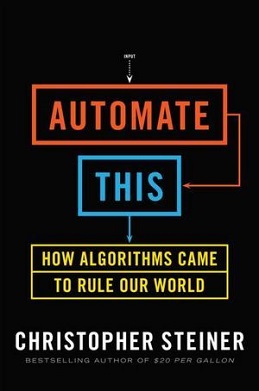 W
WAutomate This: How Algorithms Came to Rule Our World is a book written by Christopher Steiner and published by Penguin Group. Steiner begins his study of algorithms on Wall Street in the 1980s but also provides examples from other industries. For example, he explains the history of Pandora Radio and the use of algorithms in music identification. He expresses concern that such use of algorithms may lead to the homogenization of music over time. Steiner also discusses the algorithms that eLoyalty was created by dissecting 2 million speech patterns and can now identify a caller's personality style and direct the caller with a compatible customer support representative.
 W
WThe End of Work: The Decline of the Global Labor Force and the Dawn of the Post-Market Era is a non-fiction book by American economist Jeremy Rifkin, published in 1995 by Putnam Publishing Group.
 W
WThe Future of Work and Death is a 2016 documentary by Sean Blacknell and Wayne Walsh about the growth of exponential technology.
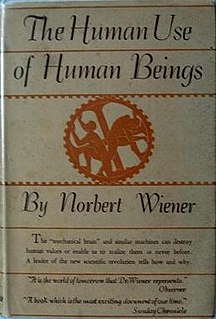 W
WThe Human Use of Human Beings is a book by Norbert Wiener, the founding thinker of cybernetics theory and an influential advocate of automation; it was first published in 1950 and revised in 1954. The text argues for the benefits of automation to society; it analyzes the meaning of productive communication and discusses ways for humans and machines to cooperate, with the potential to amplify human power and release people from the repetitive drudgery of manual labor, in favor of more creative pursuits in knowledge work and the arts. The risk that such changes might harm society is explored, and suggestions are offered on how to avoid such risk.
 W
WHumans Need Not Apply is a 2014 short film directed, produced, written, and edited by CGP Grey. It focuses on the future of the integration of automation into economics, as well as the impact of this integration to the worldwide workforce. It was released online on YouTube on 13 August 2014 and later made available via iTunes and RSS.
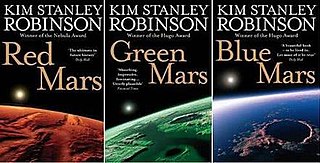 W
WThe Mars trilogy is a series of science fiction novels by Kim Stanley Robinson that chronicles the settlement and terraforming of the planet Mars through the personal and detailed viewpoints of a wide variety of characters spanning almost two centuries. Ultimately more utopian than dystopian, the story focuses on egalitarian, sociological, and scientific advances made on Mars, while Earth suffers from overpopulation and ecological disaster.
 W
WThe Master of the World is a German science fiction movie made in 1934. Its themes are the ethical replacement of human labor by robots, and the threat to humanity by robots used as war machines. It was directed by Harry Piel and made by Ariel production.
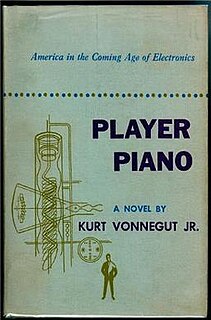 W
WPlayer Piano is the first novel by American writer Kurt Vonnegut Jr., published in 1952. The novel depicts a dystopia of automation partly inspired by the author's time working at General Electric, describing the negative impact technology can have on quality of life. The story takes place in a near-future society that is almost totally mechanized, eliminating the need for human laborers. The widespread mechanization creates conflict between the wealthy upper class, the engineers and managers, who keep society running, and the lower class, whose skills and purpose in society have been replaced by machines. The book uses irony and sentimentality, which were to become hallmarks developed further in Vonnegut's later works.
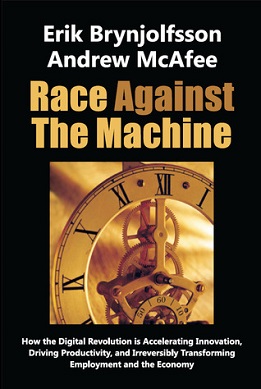 W
WRace Against the Machine is a non-fiction book from 2011 by Erik Brynjolfsson and Andrew McAfee about the interaction of digital technology, employment and organization. The full title of the book is: Race Against the Machine: How the Digital Revolution Is Accelerating Innovation, Driving Productivity, and Irreversibly Transforming Employment and the Economy.
 W
WRiders of the Purple Wage is a science fiction novella by American writer Philip José Farmer. It appeared in Dangerous Visions, the New Wave science fiction anthology compiled by Harlan Ellison, in 1967, and won the Hugo Award for best novella in 1968, jointly with Weyr Search by Anne McCaffrey.
 W
WVoyage from Yesteryear is a 1982 science fiction novel by British writer James P. Hogan.
 W
WWalkaway is a 2017 science fiction novel by Cory Doctorow, published by Head of Zeus and Tor Books.